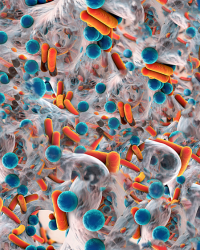Biofilm Testing
Biofilm Testing Solutions to Ensure Efficacy and Safety in Antimicrobial Products
Biofilm-associated infections significantly impact the efficacy of antimicrobial products, often reducing their effectiveness and complicating treatment strategies. iFyber's biofilm testing services can help.
iFyber specializes in biofilm testing solutions to verify the efficacy of antimicrobial medical devices and drugs. These include but are not limited to antimicrobial dressings, bio-engineered tissue products, biomaterials, bioactive dressings, and novel anti-infectives.
Biofilms pose a major clinical threat. Current US National Institutes of Health estimates suggest biofilms account for over 80% of all microbial infections. Given the relatively recent understanding of biofilms, biofilm testing is becoming an increasingly common addition to the screening profile of new antimicrobial technologies.
By taking a multi-method biofilm testing approach, treatments can be evaluated for their ability to both prevent the formation of biofilms and eradicate existing biofilms. Whether you need biofilm susceptibility testing or to evaluate the antimicrobial efficacy of a product, you can get the data and answers you need with iFyber.
What are biofilms?
- Complex communities of microbes protected within a matrix of sugars, proteins, and extracellular DNA.
- Biofilms can form on a range of surfaces, including medical devices and human tissue systems.
- Compared to free-floating (planktonic) forms of microorganisms, biofilm-associated microorganisms are more difficult to kill due largely to the presence of this protective matrix and a reduction of metabolic activity.

Biofilm Testing Services
iFyber offers a menu of assays and biofilm testing solutions that assess biofilm prevention and eradication efficacy, in addition to custom biofilm test models often needed for developing technologies to combat resistant biofilm infections.
Ex Vivo: Porcine Dermal Model (PDM)
Infections Associated with Biofilms:
- Chronic Infected Wounds
- Catheter-associated urinary Tract Infections (CAUTI)
- Central line-associated and catheter-related bloodstream Infections (CLABSI and CRBI)
- Acute Bacterial Skin and Skin Suture Infection (ABSSSI)
- Ventilator-associated Pneumonia (VAP)
- Acute Otitis Media (Ear Infection)
- Acute Vulgaris
- Gingivitis
- Cystic Fibrosis Lung Infection
- And more
Examples of Relevant Materials for Biofilm Testing:
- New antibiotics/biocides
- Coatings
- Nanomaterials
- Wound dressings
- Gels and ointments
- Wound washes
- Coated natural tissue matrices
- Coated medical devices
- And more
Infections Associated with Biofilms:
- Chronic Infected Wounds
- Catheter-associated urinary Tract Infections (CAUTI)
- Central line-associated and catheter-related bloodstream Infections (CLABSI and CRBI)
- Acute Bacterial Skin and Skin Suture Infection (ABSSSI)
- Ventilator-associated Pneumonia (VAP)
- Acute Otitis Media (Ear Infection)
- Acute Vulgaris
- Gingivitis
- Cystic Fibrosis Lung Infection
- And more
Examples of Relevant Materials for Biofilm Testing:
- New antibiotics/biocides
- Coatings
- Nanomaterials
- Wound dressings
- Gels and ointments
- Wound washes
- Coated natural tissue matrices
- Coated medical devices
- And more
Ready to elevate your research? Discover precision, expertise, and collaboration with iFyber. Contact us to discuss your biofilm testing needs.



